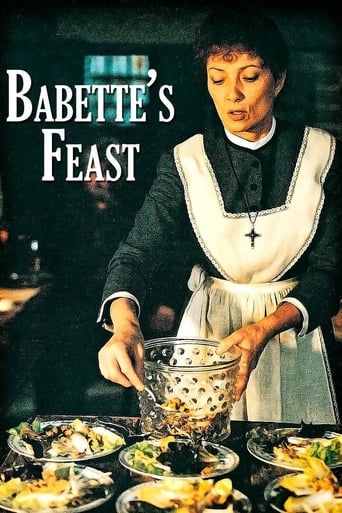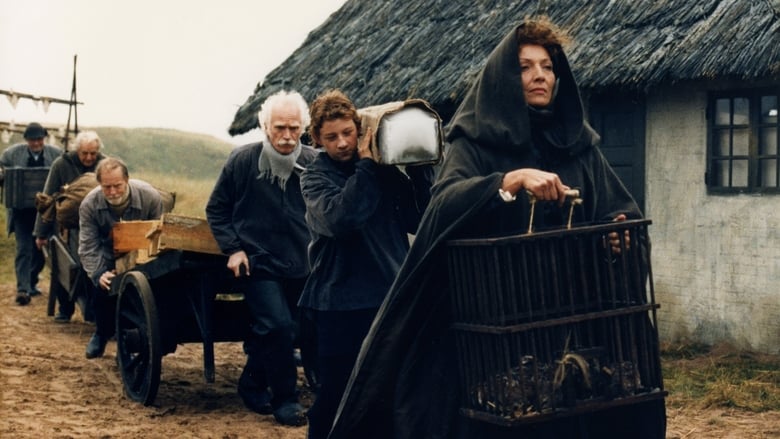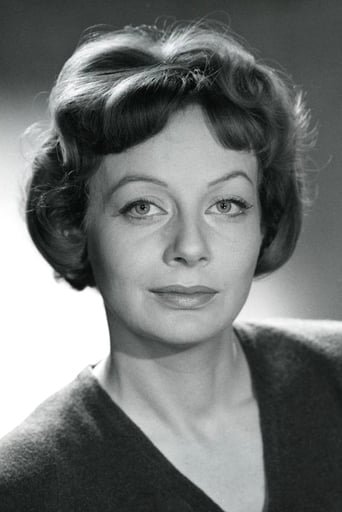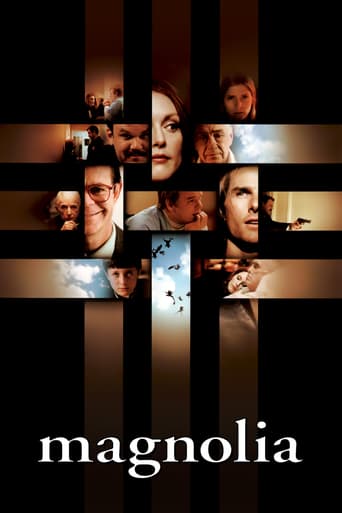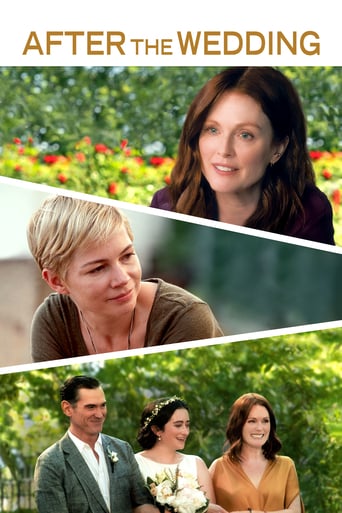Babette's Feast (1988)
A French housekeeper with a mysterious past brings quiet revolution in the form of one exquisite meal to a circle of starkly pious villagers in late 19th century Denmark.
Watch Trailer
Cast


Similar titles
Reviews
Why so much hype?
So much average
Instead, you get a movie that's enjoyable enough, but leaves you feeling like it could have been much, much more.
Great example of an old-fashioned, pure-at-heart escapist event movie that doesn't pretend to be anything that it's not and has boat loads of fun being its own ludicrous self.
Gabriel Axel's Babette's Feast, adapted from Karen Blixen's short story of the same name (written under the pen name Isak Dinesen) and winner of the Academy Award for Best Foreign Language Film, is about both the richness of true artistry and the spiritual necessity of sampling what few pleasures life has to offer during our short time on Earth. Like an exquisite, expensive meal, it moves at a slow pace and requires you to savour the delicate starters before the wholly satisfying climax arrives like a rich dessert and fine malt whiskey, resulting in the most romantic film about living a quiet, pious life ever made.Two elderly sisters, Martine (Birgitte Federspiel) and Filippa (Bodil Kjer), have lived in a windy, remote hamlet in Jutland, Denmark their entire life. Years ago, their father (Pouel Kern) was a highly respected pastor, and with his two young and beautiful daughters (played in flashback by Vibeke Hastrup and Hanne Stensgaard), ran a small conventicle, who still meet up occasionally to converse. The sisters are courted in their youth by two men - cavalry officer Lorens Lowenhielm (Jarl Kulle), who falls in love with Martine, and opera singer Achille Papin (Jean-Philippe Lafont), who happens to hear Filippa's flawless singing voice and longs to make her a star. Both reject their suitors advances out of loyalty to their marriage- spurning father, and remain alone together for the remainder of their lives.One day, a French refugee named Babette (Stephane Audran) arrives having being sent by the ageing Papin to escape the bloody Paris Commune. The sisters have no money to pay her, but take her in when Babette offers to work for food and shelter. Her swaggering nature makes her hit in the small coastal town, and she stays with Martine and Filippa for years. When she receives a letter from Paris informing her that she has won 10,000 francs in the lottery, she begs the sisters to put aside their rigorous routine and allow her to cook them and their white-haired conventicle a fine French feast. They reluctantly agree but soon become concerned at the exotic ingredients arriving at their doorstep (including a live turtle), but Babette's feast with be spiritually enlightening for everyone involved.Babette's Feast manages to gaze warmly on a life that may seem harsh and miserable to many, and the early scenes of the sisters turning their backs on a life of true love and fame is difficult to watch. But Martine and Filippa remain without any bitterness; their only concern being the dwindling resources due to a lack of new members to their flock. In their old age, the rest of the group have become quarrelsome, but as each beautiful course is served, the petty issues are mended as they all experience the earthly miracle being set out in front of them. We taste every bite and get light-headed as the wine is supped, and it's a truly sincere experience. It also retains a tenderness and a grace usually lost in movies designed to pull on the heart-strings, and this is embodied by Audran who is outstanding as the eponymous artist.
A grandmother, I presume, narrates Babette's Feast with a fairytale-like presence and charm. It is old fashioned like that, based on the short story from Karen Blixen, and the two central sisters reflect this. Flashbacks establish their devout nature and piousness. Martine is courted by a young soldier, handsome and ambitious, who later becomes an important figure in the Queen's court. Philippa by a marvellously talented singer whom has become depressed by the constant travel and only wants to settle down. The scenes of their duet and how they engage in love songs are terribly romantic, except for Philippa's expression, clearly uncomfortable by even the mere lyrics and implied sinful notions they carry (although there is a suggestion that this might be significantly from her puritan perspective - otherwise how would Papin be so sure of sending them Babette?). They live up to their Protestant figurehead namesakes that their dear father/pastor must have lovingly bestowed them; Martin Luther King and Philipp Melanchthon. So even as they are beautiful as flowering fruit trees, as they are described, they refrain from falling in love, and plead their allegiance to their father's church. When Babette, a survivor of the Paris Commune, arrives, the church community thanks and praises God for sending them this gift so that the sisters may continue to spread the good work and tend to the flock. And like so many communities there is invariably discord - accusations of affairs, people cheating other's of their money, lies and dissatisfaction. They are not oblivious to this, but they push it out of their minds for more important, high-minded issues. When Babette declares she is making a French dinner with the works, they hesitantly approve, and then are tentative on the serving of wine. It is a gateway to sin, and Axel emphasises this with a green-tinged nightmare filled with grotesque, satanic imagery fit for Revelations; fiery visions of hell, animals rearing their ugly heads, and the spill of red wine like blood. The feast is the lengthiest segment of the film, and the best. Henning Kristiansen initially establishes the rural, puritan village with a desaturated palette devoid of any idyllic environmental imagery or tempting vices. This reinforces their way of life - bare and plain, like the food that Babette serves the sisters with whatever meagre groceries that she can haggle for. And then he introduces candlelight and lamp, briefly warm in their glow, to accompany the feast. But he does not ramp this up to food porn levels - the ingredients are not exotic splashes of colour to bring life into the lives of the village - that change must come from within. The only out of place shot is the one immediately after the cathartic meal, the almost storybook scene of the endlessly beautiful starry night that looks upon their dance and song. This seems deliberately so, as if to over-highlight a new outlook on life. What many have not touched on is how funny Babette's Feast can be. The villagers all agree to shut out out temptations and refuse to comment on the food, no matter how good it is. The only one that is from a different perspective is Lorens, who has the expertise and freedom to do so. And he does too, marvelling at each course and dish and lavishing the flavours and combinations. The humour comes from the other dinner guests, who most evidently feel the same way about the food as he does, but do not want to admit it. Instead they chime awkwardly in with religious recitations that fall on deaf ears and gross, offended looks at the sinful gluttony that is occurring right beside them. The food continues to be served (in a way that is reminiscent of Big Night, and how the courses overwhelm the guests) and there is a slow epiphany. Old feuds are forgiven and forgotten, lost love is rekindled. The film is not anti-religious in any way, but serves up a tale that is able to rouse even the most pious to slurp and suck every last drop and swallow every last bite with relish. Babette may have nothing left, but ironically it is her that has gained and dished out the spiritual fulfilment, and they are all full, and so is the audience.
Much like the delicacies that grace the table in this film, each scene of "Babette's Feast" seems a treat for the senses -- a joy to behold, against the hardscrabble backdrop of Jutland, Denmark. Whenever I am asked to name my favorite film, "Babette's Feast" jumps to mind. Babette is the ultimate role model -- a woman who survives the worst of life only to rebound with strength and vibrancy. I have seen this dazzling movie several times over the years, and in the past I focused on the meal's magical impact on guests at the feast. This time around I found Babette and Achille Papin most compelling."An artist is never poor," Babette reminds us. And aren't we all, potentially, artists? Quoting the French baritone Achille (played exquisitely by Jean-Phillipe LaFont): "One long cry from the heart of the artist -- Give me leave to do my utmost!" Mirroring the bedecked table, the casting here approaches perfection. Stephane Audrane was born to play a French refugee in a small Danish village, bantering with the locals to get a better price on fish. Bodil Kjer and Brigitte Federspiel shine as a pair of religious sisters -- but, for God's sake, why couldn't Lorens's intended utter even a word to the smitten man? And Jarl Kulle fascinates as a worldly general whose military regalia belies a poetic soul. "He visited many times but it seemed to him he grew more insignificant each time." (Wow, does that line nail one of life's sadder experiences!) And later, this sensitive man confides, "...I have learned in life there are some things that are impossible..."I will never forget this film, and if I somehow become stranded on a desert island, this is the only movie I'd ever require. Babette, thank you for your example!
Lovely, literate, gentle film-making. A tale of passions and art thwarted and brought to life, with lovely photography, and solid performances. The charming story of two spinster sisters in a dour, religious Danish town who take in a French political refugee. After years of working for these women, with gratitude and gentleness, but little expressed emotion, the woman (Stephane Audran) uses lottery money she wins not to return to France, or to start her own life, but to create a feast, bringing back her own lost artistry as one of France's great chefs. In spite of their promise not to get swept up in the food, the locals slowly succumb to it's sublime mix of the sacred and the sensual. All of this is sweet, interesting, entertaining and well told, but for me there's also something a tiny bit thin about it. It feels like a short story stretched to feature length (which it is), and I didn't find it quite as moving emotionally as I wished. Many like it more than me, but to me it's a lovely, well-told, worthwhile film, but not quite a great one.

